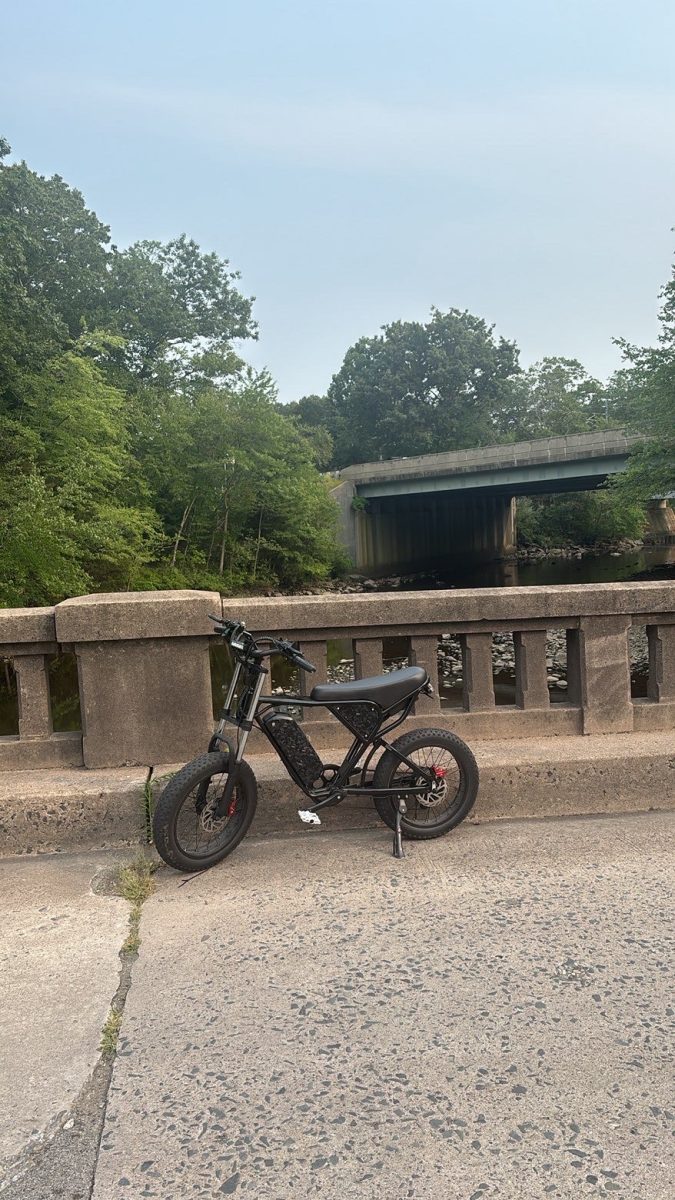E-bike speeds can vary greatly, from 250 watts up to 3000 watts. A 750-watt bike might be able to reach 20-28 miles per hour and might be able to climb hills way easier than a 250-watt bike, which goes around 15 miles per hour, according to NBCconnecticut.org. Whereas a 3000 Watt bike can go up to 45-70 miles per hour.
Those speeds can sometimes lead to problems. Some students also shared they’ve had negative encounters with police officers while riding e-bikes. “There was a group of me and my friends, and they stopped us, trying to say we were doing stuff we weren’t,” said Anthony. He added that police enforcement should be fairer and more consistent between towns.“If they just check what wattage the bike is, it shouldn’t be a problem,” Anthony said.

Mateo agreed, saying that the police sometimes waste time targeting harmless riders.
“Half the time, it’s just the time just middle schoolers or freshmen with little bikes that go 20 miles per hour,” he said. “Cops shouldn’t be wasting time on that. They should be solving real crimes.”
While many students disagree with parts of the new law, others support it for safety reasons. “The helmet rule makes sense,” Mateo said, “People should wear helmets anyway.” Another student, John King, a freshman at The Morgan School, said the law doesn’t make much of a difference.“They’re pretty much just enforcing laws that were already there,” he said.
For those with a bike, 750 watts or over will receive a warning for driving without a license, depending on what they are stopped for, but there is a risk that the bike can be impounded. Also, failure to wear a helmet can result in a 90$ fine. Some laws that might hit some Morgan students may be among these.
This is a problem for several students. After learning the license and registration requirements, John King began to question how reasonable those rules are: “You need a license for 750 watts? That’s dumb,” he said. “And impounding bikes? That’s unnecessary.
For most students, the biggest concern isn’t the idea of safety itself, but how the law will be applied. Many worry that young people will be unfairly targeted or treated like criminals just for riding e-bikes that are slightly more powerful than the limit.
“Kids are just trying to have fun,” Mateo said. “They shouldn’t be treated like criminals just for having an e-bike.”
Although opinions differ, one thing is clear: the new ebike law has started an important conversation among students about safety, fairness, and freedom. By Nehemiah Tracey-Cordoba
Connecticut’s new e-bike law has recently gone into effect, and many students have mixed feelings about it. The new law in Connecticut, called “An ACT CONCERNING ELECTRIC SCOOTERS, ELECTRIC BICYCLES, AND MOTOR-DRIVEN CYCLES,” now requires all e-bike riders to wear helmets. If a bike has more than 750 watts of power, the rider must have a driver’s license. Bikes that exceed 3,000 watts need to be registered and insured, just like motorcycles.
Some students say the new rules don’t affect them much because they already follow safety precautions.
Anthony Alberino, a freshman E-bike Rider, said, “It doesn’t really bother me because my bike is under 750 watts, and I always wear a helmet,” said Anthony Alberino, a student who rides his e-bike called Macfox Electric Bike X1S from time to time.
Others think the law is too strict and unfair toward younger e-bike riders. “I think that’s a little stupid because 750 watts isn’t that fast. You can pedal a bike that fast,” a freshman at The Morgan School said, Mateo Maldonado. “But 3,000 watts, yeah, that’s fast. I think those should need a permit, but not smaller ones.”
Mateo also questioned the part of the law that requires registration and insurance for higher-powered e-bikes. “It’s electric, not gas,” he said.” You shouldn’t have to pay money every month for that.”
The insurance on an ebike can cost up to $8-17+. There is no exact price because it all depends on which electric bike you have.


